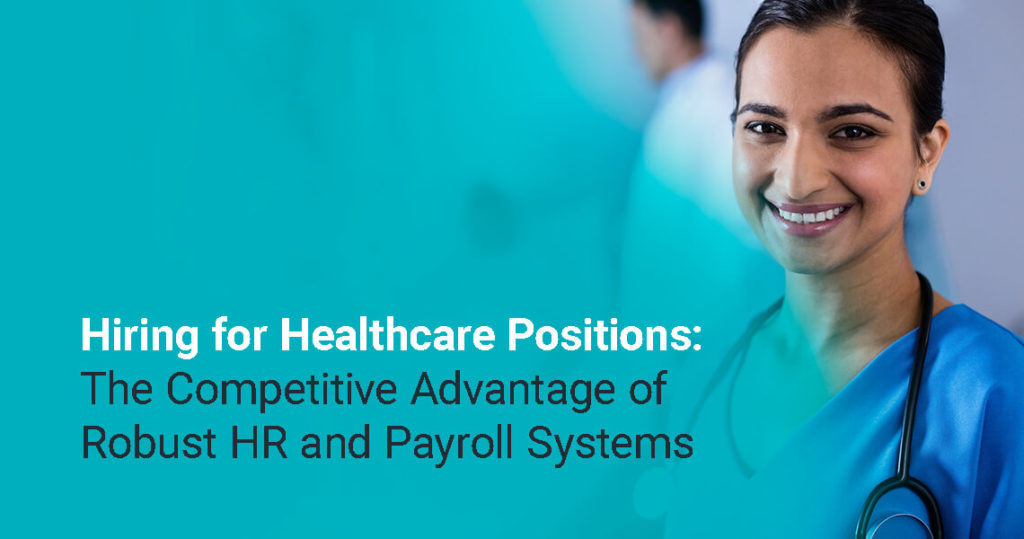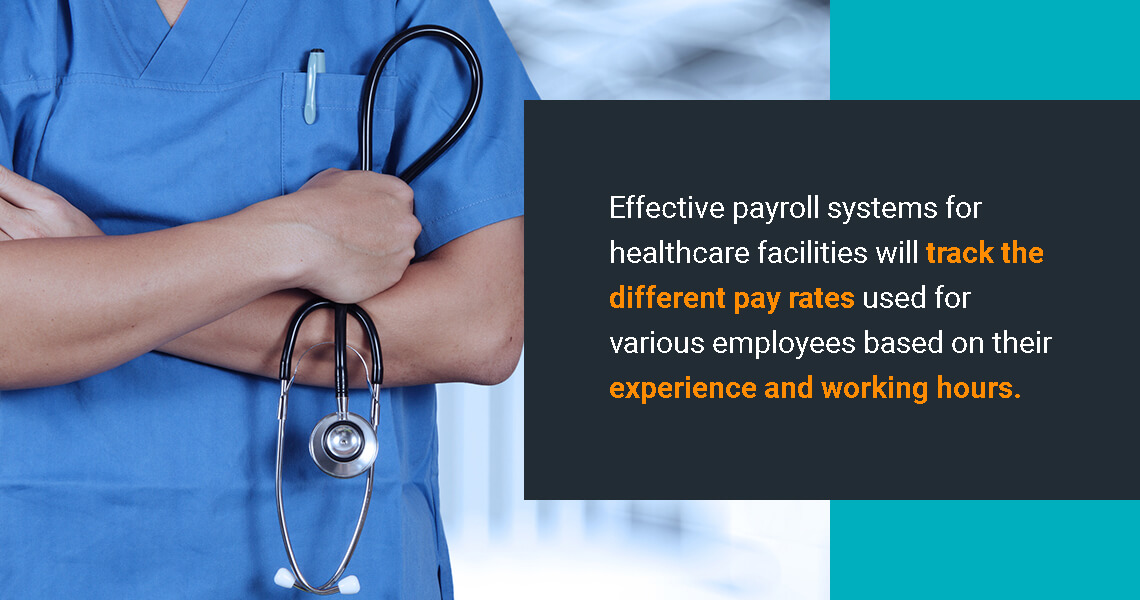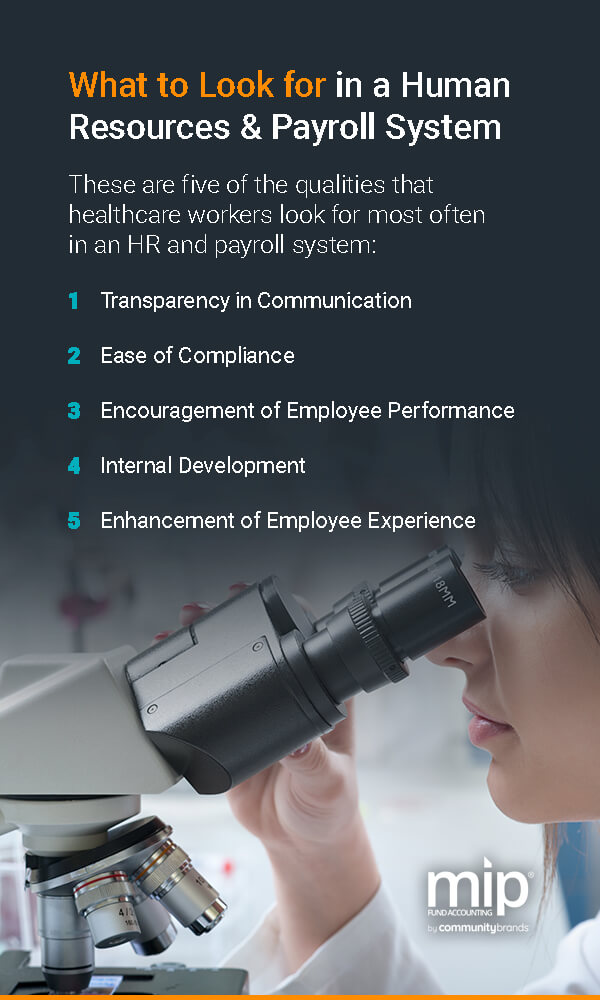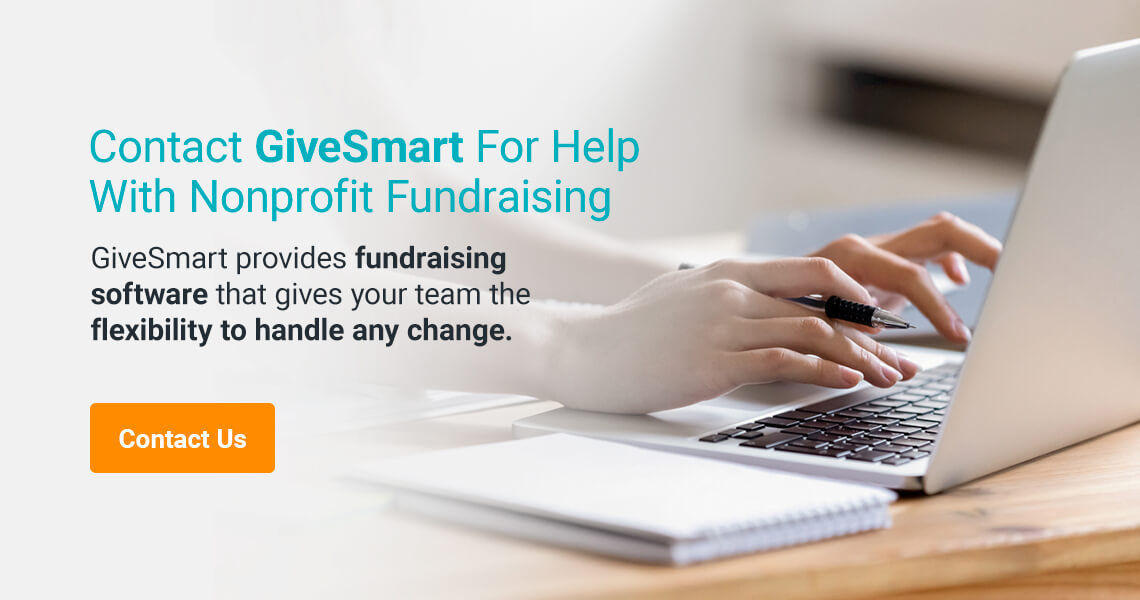Reading Time: 9 minutes
- What Are the Challenges of Hiring?
- Benefits of Robust Systems
- What to Look for in a Human Resources and Payroll System
Human resource managers perform a variety of tasks and fulfill numerous responsibilities in any business. HR managers keep vital business records, enforce workplace regulations, and perform administrative tasks. HR systems for healthcare ease all of these processes and aid managers in their administrative operations.
Among all the aspects of a human resource manager’s work, payroll processes are perhaps best-known. Payroll systems track business finances, a vital function for the success of any business. Employers can use payroll systems for healthcare to track the hours employees work, calculate their pay rate, store employee data, and stay current on tax laws.
When hiring for healthcare positions, the value of robust HR and payroll systems is significant. Employee candidates are aware the decisions HR managers make affect organizational performance and patient care. In a healthcare environment of growing need and shrinking ability to meet that need, using robust hiring technology for healthcare facilities can go a long way toward equipping your healthcare establishment to provide dynamic patient care.
What Is HR in Healthcare?
Human resource managers are integral to the function of any business. A study of global healthcare systems found proper management is especially critical to the efficient operation of a healthcare facility — HR managers deal with staffing, development, performance, and organizational effectiveness issues. Every healthcare facility has goals and regulations it must meet, and the HR department supports the administration and staff in achieving these objectives promptly.
The importance of secure HR relations is in their ability to impact nearly every aspect of administration in the healthcare industry. Routine processes like recruiting and hiring suitable candidates fall under their supervision, as do essential training programs. HR managers vet candidates to ensure the right employees are selected for each job, performing background checks, and limiting potential liability issues. They make sure all staff members are aware of their unique licensure and certification requirements to provide the best possible care to patients.
Hospitals and clinics support many initiatives for promoting employee retention and satisfaction. Top executives may seek input from HR on strategic planning and maximizing each employee’s productivity. HR also advises management on employee benefits and oversees the financial and legal details negotiated when hiring nurses and doctors.
Many of the concerns healthcare facilities regularly face also fall under the supervision of HR managers. They ensure the provided services are efficient for staff, clinicians, and patients alike. They handle patient claims and guide their facility through new technological advances and updated legal requirements regulations. They work closely with lawyers to guarantee the healthcare facility’s compliance with local, state, and federal laws. Their careful management helps protect their organization from lawsuit liability.
HR and Payroll in Healthcare
Together, HR and payroll systems work to manage the financial details of a healthcare facility’s operations and promote efficiency and employee satisfaction. Efficient payroll is imperative to HR functions, especially in the healthcare industry. Hospitals, clinics, and other care facilities provide life-changing services. From the receptionist who manages patient information to the physicians and nurses who provide care, every employee in a healthcare facility provides essential services and adds value to the business.
Effective payroll systems for healthcare facilities will track the different pay rates used for various employees based on their experience and working hours. Clinicians often work overtime, and many are on-call, so employers calculate their pay differently. Temporary employees and those who are part of a union will also receive differing compensation.
In a survey conducted by the American Nurses Association in early 2021, 18% of nurses intended to leave their job in the next six months. Of that group, 47% identified the primary cause was the negative impact of work on their health, and 33% stated the reason was their employer’s lack of support during the COVID-19 pandemic.
With such a seemingly unstable future of healthcare worker retention, employers have an opportunity to listen to their employees and work toward creating a more beneficial environment. Prompt pay and tracking of benefits, holidays, and taxes show employees that their employer values their contributions and considers their concerns.
What Are the Challenges of Hiring in the Healthcare Industry?
There is a lot that HR systems for healthcare can do to improve efficiency and satisfy employees. There are also many internal and external challenges that make hiring in the healthcare industry difficult. Here are some of the most common roadblocks:
1. Compliance
Ongoing professional development and training is a large part of many industries, and in healthcare, it is vital. HR managers in healthcare need to handle information regarding which employees are up-to-date on licensure or still need training. Local, state, and federal policymakers often roll out new certifications, so this is an ongoing process requiring continual reminders. Certifications include nursing licensure and a host of others that are specialized for each occupation.
There is a multitude of regulations that affect the healthcare industry as well. HR has to meet the reporting requirements outlined in the Affordable Care Act (ACA) to ensure they are accurately reporting the health care coverage they provide their employees. The Health Insurance Portability and Accountability Act (HIPAA) of 1996 is another challenging legislation. A considerable amount of data passes through the hands of a human resources manager, making legal compliance with HIPAA privacy standards a challenge.
2. Employee Burnout
Burnout, the experience of job-related exhaustion resulting in lower performance, is an increasingly common occurrence among healthcare professionals. The PRC National Nursing Engagement Report found that 15.6% of nurses experienced burnout in 2019. Among physicians, the number is much higher. Among those surveyed in a recent study, over 50% of all physicians reported feelings of burnout in their profession.
Professional burnout can have many underlying causes. Healthcare workers may be overwhelmed by the COVID-19 pandemic, frustrated with insufficient staffing and support, or unable to deliver quality care consistently. Healthcare facilities can address these issues and think of solutions to make a positive impact on employee retention.
3. Learning and Development
In addition to mandatory compliance training, a healthcare facility may require other training and development for their employees’ benefit. These include sexual harassment training and learning seminars to help employees navigate leadership and new technology. Some hospitals are even investing in cross-training staff to be multi-specialty employees to combat the growing healthcare worker shortage.
Learning and development are beneficial at every stage of employment. Many entry-level healthcare workers face obstacles like the high cost of training, hard-to-complete prerequisites, and the inability to attend training due to their schedules. Often, the unpredictable scheduling of employees makes it difficult for HR managers to schedule training times.
Continued staff education carries a host of benefits. Employee development leads to greater employee retention and morale, job competency, and efficiency. It ultimately contributes to patient well-being.
4. Communication
Poor communication in healthcare facilities can cause dangerous misunderstandings between patients and providers. Healthcare workers must be able to understand patients as they describe their symptoms and pain. Nurses must communicate those symptoms to clinicians effectively so they can prescribe the right treatment plan. Clinicians must then be able to communicate treatment results to patients to encourage their healing.
Ineffective communication can result from many factors within a healthcare setting, including poor documentation, inefficient policies, language and power barriers, conflicts between staff, and workload pressures. HR should make every effort to minimize these issues and promote optimal communication between all levels within healthcare. HR managers tend to this issue by assessing the effectiveness of procedures and determining what other steps will develop healthy communication methods.
5. Employee Turnover
Employee retention in healthcare settings has declined in recent years. Since 2016, the average hospital has had a 90% turnover rate of its workforce. Meanwhile, analysts expect the healthcare industry to add 2.6 million jobs from 2020 to 2030. With such a growing need, HR managers and other administrative officials need to find a way to slow the turnover and improve employee retention.
HR managers implement hiring practices to try to limit turnover. They seek candidates who are qualified and perform background checks to limit liabilities. Patient care and safety are important issues to consider, so validating a candidate’s licensure and certification is a high priority.
The Benefits of Robust Systems for Healthcare Employees
An advantage of HR systems in healthcare is their ability to improve a myriad of systems within a facility. Patients also benefit from an effective HR and payroll system. Learn more about how a robust payroll system contributes to a business’ overall productivity and employee satisfaction.
1. Benefits to HR Employees
Even in small healthcare facilities, it can be impossible for HR to track payroll manually. There are so many factors that go into paying employees what they have earned. Large facilities especially need a streamlined payroll system that allows them to automate some of their essential tasks.
An automated payroll system is also a secure place to store employee data. HR departments can access employee records they need from a single location. One aspect of hiring technology for healthcare is cloud computing, which allows HR managers to search for and assess candidates even before interviewing.
2. Benefits to All Employees
Employee retention is perhaps the most significant benefit of payroll systems for healthcare. A system that is easy to use and accurately tracks hours worked and pay earned is part of an employer’s fulfillment of their promise to their employees to compensate them fairly for their labor.
A study by the American Payroll Association found that 49% of U.S. workers will leave a position after only two incorrectly issued paychecks. There is a lot of pressure on any business’ payroll system. When a company tracks time and pays employees accurately, they earn more employee trust and respect.
3. Benefits to Patients
Under HIPAA laws, patients have a right to determine if, when, and with whom to share their health information. They even collaborate with the IT department to protect patient health records. It is the responsibility of HR to keep these records from misuse by employees or hackers.
What to Look for in a Human Resources and Payroll System
Some aspects of payroll systems for healthcare will have a greater effect on business efficiency than others. These are five of the qualities that healthcare workers look for most often in an HR and payroll system:
1. Transparency in Communication
According to recent data, many healthcare workers feel they lack support from their administration and supervisors following the COVID-19 pandemic. Corporate mismanagement and other kinds of scandals have made employees more attune to the transparency of their employers.
HR is in an excellent position to cultivate an ethos of openness and honesty among employees. The HR manager can increase their trustworthiness by taking complaints seriously and sharing changes, updates, and requirements with staff. HR software can also allow employees to communicate with each other from anywhere to receive all the updates as they occur.
2. Ease of Compliance
The large amount of sensitive data housed in HR and payroll software can make compliance difficult as regulations shift. It is time-consuming to manually check all employee information to determine who needs training.
With HR software, all necessary forms can be stored and shared online. HR can also perform an audit of employee information to quickly analyze what certifications need to be completed. Another benefit of payroll systems for healthcare is that they reduce the risk of human errors.
3. Encouragement of Employee Performance
High-quality patient care is dependent on the performance of healthcare employees. Burnout, frustration, and poor communication can all lead to decreased performance. Employee performance is a serious concern and should receive appropriate attention from supervisors.
There are several methods HR can use to encourage employee performance at every level. First, they can open up channels for transparency to inspire honesty and promote best practices. Companies can implement whistleblower hotlines and anonymous supervisor evaluations, so employees feel comfortable alerting HR when an issue arises. They can also institute performance management programs to set goals and help employees achieve them.
4. Internal Development
Employee turnover is costly to a business, and it disrupts the stability of operations. In addition to its other benefits, investing in internal development helps promote the retention of staff. When their professional lives are valued and encouraged, employees will feel that their current position enhances their careers.
One report found healthcare employees spent an average of 25.5 hours per year on continued learning. This average is lower than the national average across all industries, which is 34.1 hours. Healthcare facilities can invest in employee learning and cross-training to help careers thrive and patient care improve.
5. Enhancement of Employee Experience
Creating an overall positive employee experience may do a lot to help decrease employee turnover. An effective HR software empowers employees to track their metrics and access their data.
Features like direct deposit and employee self-service, among others, can help employees feel in control of their data. HR management should also utilize people analytics to understand employees’ needs and concerns so they can make informed decisions about improving employee welfare.
For Help With Nonprofit Fundraising, Contact GiveSmart
Healthcare facilities aim to create positive change in their communities. They work to provide the best patient care possible while handling legal responsibilities and the duty to improve their employees’ well-being. All healthcare facilities, especially nonprofit organizations, focus on the most critical needs in their communities.
If you are involved in a nonprofit healthcare organization, you know that fundraisers are vital to your operation. The support of donors keeps your facility sustainable and amplifies your cause to others who may be able to help.
You also know that fundraising events are essential to your efforts. You want to give donors the ability to donate any time so that if those events are canceled, your nonprofit can still receive essential support.
GiveSmart provides fundraising software that gives your team the flexibility to handle any change. GiveSmart has online and virtual fundraising options that connect your donors no matter their location. With our fundraising solutions, you can get closer to your donors than ever before. Contact us today and request a demo of our fundraising software to see what GiveSmart can do for your nonprofit health organization.







